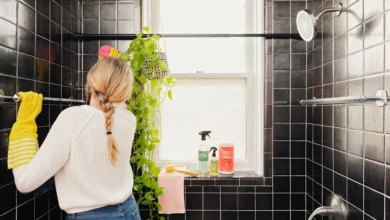If you tried to remove the hair from the drain and didn’t get much hair it may be another problem clogging your drain.
The drain snake works great on almost all bathtub and shower drains. Plus, it is easy to use to unclog a bathroom sink drain without removing the stopper. It just easily slides in the drain and under the stopper.
So next time you are dealing with hair clogging a drain skip the Draino and grab one of these reuable drain snakes to get the drain cleaned in minutes. You can easily use it to unclog a bathtub, sink or shower drain. Knowing how to get hair out of drain can be a huge timesaver and money saver.
How to Keep Drains From Clogging
If you want to stop hair from building up you can use these awesome Tub Shrooms. They come in different colors and metals and they stop hair from getting in your drain.
Rinse the drain after use: After taking a bath or shower, run hot water down the drain for a few seconds to rinse away any remaining hair or soap scum.
Use a natural drain cleaner regularly: To prevent buildup and clogs, use my DIY drain cleaner.
5 Ways to Clear Clogs Without a Drain Snake
Here are some ways to clear drain clogs without using a drain snake:
Plunger
A plunger is a simple and effective tool for clearing drain clogs. Place the plunger over the drain and create suction by pushing and pulling the plunger up and down. This can dislodge the clog and allow water to flow freely again.
Natural Drain Cleaner
Use my DIY drain cleaner to make a natural solution.
Boiling water
Boil a pot of water and carefully pour it down the drain. This can help loosen and dislodge the clog by dissolving the gunk between the hair.
Wire hanger:
Straighten out a wire hanger and bend one end to create a hook. Insert the hook into the drain and use it to pull out any hair or debris that may be causing the clog.
Wet/dry vacuum:
Use a wet/dry vacuum to suck out the clog from the drain. This method can be effective for removing larger clogs, but it may not work as well for smaller clogs.
These methods can help clear drain clogs without using a drain snake, but if none of these methods work, I highly recommend investing in the drain snake! For the price, you can beat it.
Common FAQs
Will bleach dissolve hair in a bathtub drain?
Bleach may be able to dissolve hair in a bathtub drain, but it’s not a recommended method for clearing clogs. Since it is a strong chemical that can be damaging to pipes and can also be harmful to humans and the environment.
Additionally, bleach can react with other chemicals present in the drain and create toxic fumes.
Does hydrogen peroxide dissolve hair in drain?
Hydrogen peroxide can help dissolve hair clogs in a drain, but it is not the most effective method.
Even though it’s a mild acid that can help break down hair and other organic material that may be causing the clog, it’s not as strong as some other drain cleaners, so for stubborn clogs it’s best to use a drain snake.
Why do plumbers say not to use Drano?
Plumbers generally advise against using Drano and other chemical drain cleaners because they can cause more harm than good. Here are a few reasons why:
Damage to pipes: Chemical drain cleaners are highly corrosive and can damage pipes over time. If used too frequently, they can weaken pipes and lead to leaks or even pipe failure. It may also melt the glue between PVC pipes, which leaves your plumbing system unuseable.
Environmental concerns: Chemical drain cleaners contain harsh chemicals that can be harmful to the environment. When they’re flushed down the drain, these chemicals can enter the water supply and cause pollution.
Safety concerns: Chemical drain cleaners can be dangerous if not used properly. They can cause skin and eye irritation and release toxic fumes when mixed with other chemicals. If ingested, they can cause severe injury or even death.
Ineffectiveness: In some cases, chemical drain cleaners may not even work to clear a clog.
Instead of using chemical drain cleaners like Drano, plumbers often recommend using natural methods like a plunger, a drain snake, or a natural drain cleaner made from baking soda and vinegar.
These methods are generally safer and more effective at clearing clogs without causing damage to pipes or harm to humans or the environment.




